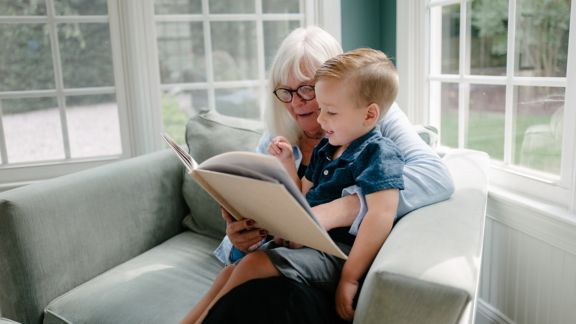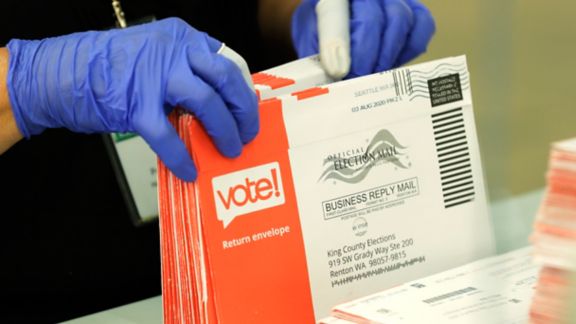Acceptance for Gay and Lesbian People Grows in the U.S.

This article is from our NORC Now newsletter. Subscribe today.
June 2024
A nationwide survey of attitudes toward LGBTQ+ people finds lagging support of transgender and nonbinary people.
NORC conducted a nationwide survey as a follow-up to a landmark 1985 Los Angeles Times survey.
Acceptance of gay and lesbian people has grown substantially in the United States since 1985, according to a nationwide survey conducted by the NORC at the University of Chicago for the Los Angeles Times. Acceptance of transgender and nonbinary people is lower on a number of measures. For example, these groups continue to face some resistance to medically appropriate care access, sports participation, running for office, and acceptance at home and in school.
To gauge changing attitudes toward gay and lesbian people, NORC repeated several questions included in a landmark 1985 Los Angeles Times survey on the topic. The California Endowment, a private nonprofit foundation, funded the new survey. The poll included 1,624 people, including 775 Californians and 313 self-identified members of the LGBTQ+ community. It also included new questions about support for transgender, nonbinary, and bisexual individuals.
Despite dramatically increased acceptance of gay and lesbian people overall, support for transgender people lags slightly.
Most adults now report knowing a lesbian or gay person, compared with just one in four who did in 1985. The proportion of respondents who did not have a problem with sexual relations between same-sex adults grew from about one-third in 1985 to about two-thirds in 2024. The percentage of people who reported they would be very upset if their child were gay or lesbian also dropped from 64 percent to 14 percent. Eight in ten respondents now say they approve of gay, lesbian, or bisexual individuals living their lives as they wish. One in five respondents in the 2024 survey said they would be less likely to vote for a political candidate who was gay or lesbian compared with about half in 1985, and about three-quarters of 2024 respondents said the candidate’s sexual orientation did not matter at all.
Support for transgender and nonbinary people was somewhat lower than for gay or lesbian people, with about one-quarter of people reporting they would be very upset of if their child were transgender or nonbinary. Still, seven in ten approve of transgender and nonbinary adults living their lives as they wish. About one-third said they would be less likely to vote for a political candidate who was transgender or nonbinary.
“Acceptance of transgender and nonbinary people is lagging behind acceptance of gay and lesbian people. That translates into less public support for certain inclusive policies,” said Dan Malato, senior research director in the Public Affairs & Media Research department at NORC.
Despite a raft of state laws seeking to restrict access to gender-affirming care, just 25 percent of U.S. adults support laws banning gender-affirming care for adults, and about half, 54 percent, support bans on such care for minors.
Support for LGBTQ+ people varied by political and religious affiliation.
Acceptance for LGBTQ+ individuals varies by political and religious affiliation. Republicans and Protestants were more likely to oppose same-sex relationships between adults than Democrats or nonreligious individuals, respectively. Protestant and Catholic adults were more likely to say they would be upset about having a transgender or nonbinary child. Republicans were also more likely than Democrats to be upset about having a gender-nonconforming child. People who were LGBTQ+ or had acquaintances who were LGBTQ+ were also more accepting than other groups.
“Republicans, Protestant, and Catholic adults were less likely to be accepting of LGBTQ+ people, but substantial proportions of these groups still express support,” Malato noted. For example, 47 percent of Republicans, compared with 80 percent of Democrats, say same-sex sexual relationships are not an issue, as do 63 percent of Catholics and 49 percent of Protestants, compared with 86 percent of nonreligious people.
Attitudes toward transgender and nonbinary people were particularly polarized along partisan lines. Two-thirds of Democrats think transgender and nonbinary people were born that way, compared with only one in four Republicans. Republicans were more likely to attribute transgender or nonbinary identities to societal influences, with 45 percent ascribing to that view versus 14 percent of Democrats.
Most survey participants said greater acceptance has led to more young people identifying as LGBTQ+, and more than half said social stigma led many older LGBTQ+ adults to hide their identities.
“There has been an overall positive shift in attitudes towards LGBTQ+ people since 1985, though challenges remain, particularly for transgender and nonbinary people,” Malato said.
This article is from our flagship newsletter, NORC Now. NORC Now keeps you informed of the full breadth of NORC’s work, the questions we help our clients answer, and the issues we help them address.








